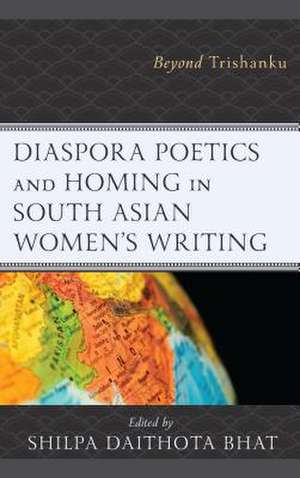DIASPORA POETICS AND HOMING INCB
en Limba Engleză Hardback – iun 2018
Preț: 536.76 lei
Preț vechi: 697.10 lei
-23% Nou
Puncte Express: 805
Preț estimativ în valută:
102.71€ • 107.73$ • 85.50£
102.71€ • 107.73$ • 85.50£
Carte disponibilă
Livrare economică 12-26 martie
Livrare express 25 februarie-01 martie pentru 29.53 lei
Preluare comenzi: 021 569.72.76
Specificații
ISBN-13: 9781498577625
ISBN-10: 1498577628
Pagini: 216
Dimensiuni: 152 x 229 x 22 mm
Greutate: 0.46 kg
Editura: Rowman & Littlefield
ISBN-10: 1498577628
Pagini: 216
Dimensiuni: 152 x 229 x 22 mm
Greutate: 0.46 kg
Editura: Rowman & Littlefield
Notă biografică
Edited by Shilpa Daithota Bhat - Contributions by Gurbir Singh Jolly; Izabella Kimak; María Alonso Alonso; Marí...
Cuprins
Introduction
Shilpa Daithota Bhat
PART I: REALIZING TRISHANKU
Chapter 1 ¿ Representation & Memorialization of the Experiences of Indian Labour Migrants
Marina Carter
Chapter 2 ¿ Uprooted and Dispossessed: An Ecocritical Feminist Reading of Farida Karodiäs Other Secrets
María Jesús Cabarcos Traseira
Chapter 3 ¿ Pursuing the Indo-Caribbean Diaspora through Ramabai Espinet¿s The Swinging Bridge
Maria Alonso Alonso
PART II: CONFIGURING HOME
Chapter 4 ¿ "There's No Place Like Home": Travel as Erasure in Three, Turn-of-The-Century Narratives
Gurbir Singh Jolly
Chapter 5 ¿ A Passage from India: The Darkly Funny in Meera Syal¿s Anita and Me
Setara Pracha
Chapter 6 ¿ Relocating Home and Diasporising the South Asian Queer
Shuhita Bhattacharjee
Chapter 7 ¿ Negotiating Home and Homeland through Women¿s Life-Writing
Sam Naidu
PART III: EXPLORING HOSTLANDS
Chapter 8 ¿ Bharati Mukherjee¿s Jasmine and the Romance of the Refugee Governess
Reshmi J. Hebbar
Chapter 9 ¿ Exploring Race in the Poetry of Vandana Khanna, Pireeni Sundaralingam and Dilruba Ahmed
Mitali P. Wong
Chapter 10 ¿ Corporeality and Search for Home in Bharati Mukherjee¿s Fiction
Izabella Kimak
Epilogue ¿ Short Story¿¿Abbey and Me¿
Vanita Seth
Descriere
This book looks at women writers from the South Asian region who negotiate Home from the vantage point of in-between space-defined through the mythical concept of Trishanku and the frameworks of migration, historical consciousness, colonialism, interracial experiences, fragmented memories, nostalgia, and hyphenated identities.
